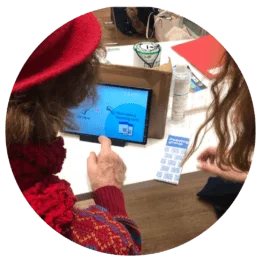
We believe that a 81% successful engagement (consistent attendance by nine out of 11 participants) reinforced by a strong desire among the cohort to continue the activities beyond the pilot project is a positive result.
The Digital Befriending Kit was used consistently and largely successfully by all the participants with support from their carers.
We believe there is more to do to reach people living with dementia who live alone and we think that, with more time, this approach alongside greater levels of in-person individual training and support would show promise.
Our ambition was to create a designed intervention that could help people living with dementia who have little technical literacy (and their carers) to engage with social activity online.
Our community testing put a lot of emphasis on the person with dementia using the kit themselves and this came with mixed success. But carers can also be isolated and digitally excluded and can benefit greatly from social connection online. The carers on the pilot, though not all digitally excluded themselves, found the kit easy to use and we believe that we have created something accessible to a broad range of ability.
Even in the homes that had some technology already, there appeared to be clear value in having a device for the person living with dementia that was ‘for them’ and tailored ‘for their activity’.
The printed invitations and the stand were well received and used throughout the pilot. Participants liked receiving a specific invitation for a specific event (bingo) in the post and the tangible nature of the printed invitations served a valuable role in engaging people in the project and calls.
Our primary take-away from this project could be that ‘Making the digital tangible’ as much as possible is a good way to approach digital exclusion. Printed invitations take more time than emails but are worth the effort and expense and we have created a useful tool to make it easy to do.
More testing – specifically with a group of participants who live alone without access to support – is required to fully understand the impact of the kit on increasing digital inclusion and reducing isolation. Most participants were not the most isolated or lonely before the pilot and many already had an internet connection at home even if they did not use it.
The scope of this project was to take a creative approach to a very difficult challenge of reaching some of the most digitally excluded people. There is more to do but we hope the ideas and insights in this toolkit can contribute significantly to efforts to create accessible and affordable technology packages and get more people online.